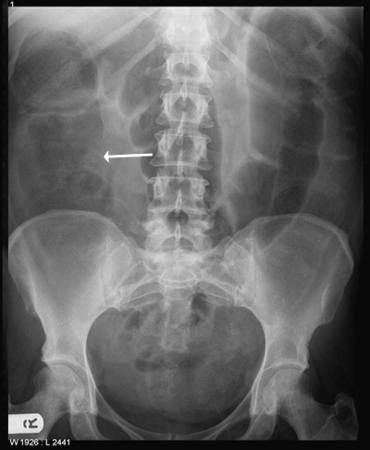Summary
Definition
History and exam
Key diagnostic factors
- colicky abdominal pain
- abdominal distention
- nausea
- vomiting
- change in bowel habits
- hard feces
- soft stools
- empty rectum
- recent weight loss
- rectal bleeding
- palpable rectal mass
- palpable abdominal mass
- tympanic abdomen
- abnormal bowel sounds
- fever
- abdominal tenderness
- abdominal rigidity
Other diagnostic factors
- tenesmus
Risk factors
- colorectal cancer
- current or previous malignancy
- diverticular disease
- colonic volvulus
- inflammatory bowel disease
- current or previous hernia
- endometriosis
- diabetes
- previous abdominal surgery
- megacolon
- low or high dietary fiber
- laxative abuse
- previous radiation therapy
- ingestion of foreign body
Diagnostic tests
1st tests to order
- CT abdomen and pelvis
- CBC
- serum electrolytes
- CRP
- renal function
- glucose
- coagulation studies, type and screen, cross-match
- blood gas analysis (including lactate)
- serum amylase/lipase
- plain abdominal x-ray
Tests to consider
- beta-human chorionic gonadotrophin
- urinalysis
- abdominal ultrasound
- contrast enema
- flexible/rigid endoscopy
- biopsy
Treatment algorithm
acutely ill
sigmoid volvulus
cecal volvulus
colorectal malignancy
diverticular disease
foreign body ingestion
benign strictures
pelvic abscess
currently receiving palliative care
Contributors
Expert advisers
Adrian A. Maung, MD, MBA, FACS, FCCM
Associate Professor of Surgery
Division of General Surgery, Trauma and Surgical Critical Care
Department of Surgery
Yale School of Medicine
Surgical Director of Perioperative Services
Adult Trauma Medical Director
Yale New Haven Hospital
New Haven
CT
Disclosures
AAM declares that he has no competing interests.
Acknowledgements
Dr Adrian A. Maung would like to gratefully acknowledge Dr George Malietzis, Dr John T. Jenkins, and Dr Alisdair J. MacDonald, previous contributors to this topic.
Disclosures
GM, JTJ, and AJM declare that they have no competing interests.
Peer reviewers
Alessandro Fichera, MD, FACS, FASCRS
Assistant Professor
Department of Surgery
University of Chicago
Chicago
IL
Disclosures
AF declares that he has no competing interests.
Robert H. Diament, MD
Consultant Surgeon
Crosshouse Hospital
Crosshouse
Kilmarnock
UK
Disclosures
RHD declares that he has no competing interests.
Peer reviewer acknowledgements
BMJ Best Practice topics are updated on a rolling basis in line with developments in evidence and guidance. The peer reviewers listed here have reviewed the content at least once during the history of the topic.
Disclosures
Peer reviewer affiliations and disclosures pertain to the time of the review.
References
Key articles
Alavi K, Poylin V, Davids JS, et al. The American Society of Colon and Rectal Surgeons clinical practice guidelines for the management of colonic volvulus and acute colonic pseudo-obstruction. Dis Colon Rectum. 2021 Sep 1;64(9):1046-57.Full text Abstract
Pisano M, Zorcolo L, Merli C, et al. 2017 WSES guidelines on colon and rectal cancer emergencies: obstruction and perforation. World J Emerg Surg. 2018 Aug 13;13:36.Full text Abstract
Naveed M, Jamil LH, Fujii-Lau LL, et al. American Society for Gastrointestinal Endoscopy guideline on the role of endoscopy in the management of acute colonic pseudo-obstruction and colonic volvulus. Gastrointest Endosc. 2020 Feb;91(2):228-35. Abstract
Reference articles
A full list of sources referenced in this topic is available to users with access to all of BMJ Best Practice.

Differentials
- Acute colonic pseudo-obstruction (Ogilvie syndrome)
- Chronic/idiopathic megacolon
- Toxic megacolon
More DifferentialsGuidelines
- WSES consensus guidelines on sigmoid volvulus management
- 2017 WSES guidelines on colon and rectal cancer emergencies: obstruction and perforation
More GuidelinesVideos
Venepuncture and phlebotomy: animated demonstration
Central venous catheter insertion: animated demonstration
More videosPatient information
Bowel cancer
Bowel cancer: questions to ask your doctor
More Patient informationLog in or subscribe to access all of BMJ Best Practice
Use of this content is subject to our disclaimer